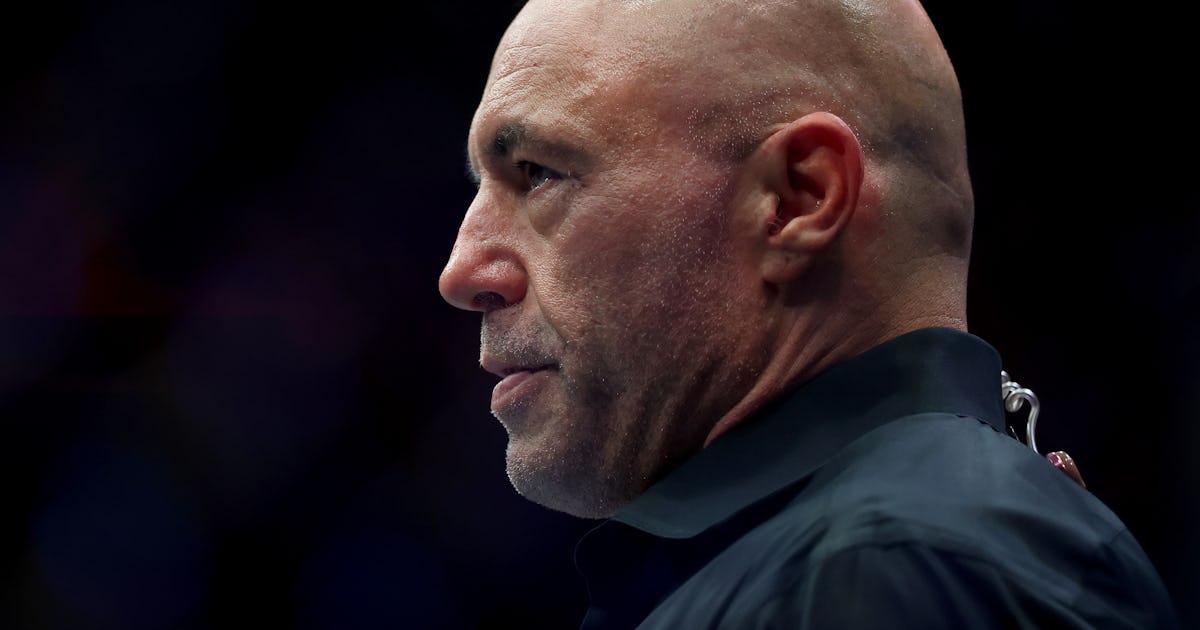Having kids on the internet is no simple thing, especially when the manosphere gets involved. While there are plenty of influencers who spout hateful rhetoric or promote toxic masculinity, some have also been vocal about a health treatment they’re using — testosterone replacement therapy (also known as TRT, or just T). As a result of big names like Joe Rogan and Dax Shepard talking about taking TRT, doctors are seeing more college-aged young men than ever before coming to their offices seeking or already taking a prescription, USA Today reports. Experts say that unless we want Rogan and his ilk to be the ones educating our sons about testosterone therapies, we need to start our own conversations with them. So, how should parents be talking to their boys about TRT now, before they move out and start scheduling their own doctors’ appointments?
Enter the search term “testosterone maxxing” on TikTok, and you’ll begin to see just how much content there is about the subject online for teens to get sucked into. Influencers regularly post about why “alphas” and “high-level men” take T, how it helped them pack on muscle and increase their sex drive. Digital media experts blame the desire to achieve hypermasculinity through boosting testosterone on the rise of manosphere influencers, as Dazed reported. And today, there’s an entire wellness industry selling testosterone injections and supplements when in reality, most young men simply don’t need them. What’s worse, they could potentially cause serious harm.
What does TRT do?
TRT is used to treat patients with hypogonadism, a condition which causes low testosterone levels and a variety of symptoms — think brain fog, low energy and libido, erectile dysfunction, loss of muscle mass, and more, says board-certified urologist Dr. Jason Carter of Aeroflow Urology.
“It’s not just about having a low lab number; it’s about having low levels plus real symptoms that affect quality of life,” says Dr. Justin Houman, assistant professor of urology at Cedars-Sinai. “TRT helps bring testosterone back to a normal, healthy range, which can improve mood, energy, sexual function, and overall well-being.”
Should young men be “testosterone maxxing”?
Both doctors were very clear: TRT is not intended to be used to enhance athletic performance or “lifestyle optimization,” as Carter put it. That’s because there is no benefit to taking it for young, healthy men, but there is a lot of risk. “It should only be recommended for patients with clear symptoms of low testosterone confirmed by appropriate laboratory testing. For athletes or young men seeking enhanced performance, it does not reliably improve strength or endurance beyond what proper diet, sleep, and training can achieve. Its risks far outweigh any perceived benefit in this group,” he says.
Those risks include reducing sperm production, sometimes causing temporary or permanent infertility, breast tenderness, high blood pressure, mood changes, and increased risk of thrombosis (blood clots blocking veins or arteries), and oral testosterone supplements also come with a risk of liver toxicity, Carter says.
Houman has his own warning: “Young, healthy men already make high levels of testosterone naturally. Adding more does not turn you into a superhuman version of yourself; it usually just causes side effects and shuts down your own system. The brain senses that extra testosterone is coming in and stops signaling the testicles to make their own. Over time, this can shrink the testicles, lower fertility (sometimes long-term), and throw off other hormones like estrogen and DHT. There’s also a risk of increased red blood cell counts, acne, worsening sleep apnea, and possible effects on heart health if it’s not properly monitored,” Houman says.
More often than not, young men who feel tired or like their athletic performance isn’t up to snuff can chalk it up to stress, poor sleep, alcohol or drug use, or overtraining, “not a true testosterone deficiency,” Houman adds.
How should you talk to teens about TRT & health information online?
Both of these doctors are seeing more and more young men coming to their offices, convinced they need TRT despite their labs being normal, or asking questions because they heard on a podcast that TRT would make them “more muscular or more masculine,” Houman says. He points out that these patients rarely understand the risks, since they’re generally never mentioned online or in those same podcasts. Carter says it’s because TRT is positioned as a “quick fix” for common challenges, such as stress, fatigue, or confidence issues.
“They ignore the basics — good sleep, nutrition, stress management — and instead risk shutting down their body’s natural testosterone production permanently. As parents, it’s important to know this hype is everywhere online, and it’s selling your sons a dangerous shortcut instead of helping them build real, lasting health,” he says.
Both doctors agree you should have a nonjudgmental conversation with your teens about what they’re hearing about TRT online. Help them think critically about this content — and content they may see in the future — by teaching them to interrogate it. Ask:
- Who is this influencer? Do they have legitimate medical credentials, ones you can verify? And, are they speaking within their realm of expertise? (For example, would you ask a dermatologist about an ACL injury? No! The person should be credentialed in the field they’re giving advice about.)
- Do they cite real evidence when talking about a product, treatment, or supplement?
- Do they talk about the benefits and the risks?
- Does the person promoting a product or supplement make money from it?
Having these conversations sets your child up to be more literate in health as they grow. It can also give you insight into how they’re dealing with the pressures all teens face, like body image and the idea that men should look and act certain ways. “Reinforce that there’s no shame in normal struggles and that real health comes from sleep, nutrition, exercise, stress management, and, if needed, proper medical care. By keeping the conversation open and informed, you can help protect them from risky choices sold as quick fixes,” Carter says.
Disclaimer: This content was automatically imported from a third-party source via RSS feed. The original source is: https://www.scarymommy.com/lifestyle/influencers-promoting-trt-to-young-men. xn--babytilbehr-pgb.com does not claim ownership of this content. All rights remain with the original publisher.

